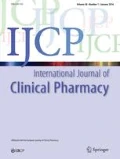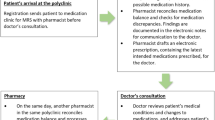Abstract
Background Medication dispensing errors (MDEs) are frequent in community pharmacy practice. A definition of MDEs and scenarios representing MDE situations in Palestinian community pharmacy practice were not previously approached using formal consensus techniques. Objective This study was conducted to achieve consensus on a definition of MDEs and a wide range of scenarios that should or should not be considered as MDEs in Palestinian community pharmacy practice by a panel of community pharmacists. Setting Community pharmacy practice in Palestine. Method This was a descriptive study using the Delphi technique. A panel of fifty community pharmacists was recruited from different geographical locations of the West Bank of Palestine. A three round Delphi technique was followed to achieve consensus on a proposed definition of MDEs and 83 different scenarios representing potential MDEs using a nine-point scale. Main outcome measure Agreement or disagreement of a panel of community pharmacists on a proposed definition of MDEs and a series of scenarios representing potential MDEs. Results In the first Delphi round, views of key contact community pharmacists on MDEs were explored and situations representing potential MDEs were collected. In the second Delphi round, consensus was achieved to accept the proposed definition and to include 49 (59 %) of the 83 proposed scenarios as MDEs. In the third Delphi round, consensus was achieved to include further 13 (15.7 %) scenarios as MDEs, exclude 9 (10.8 %) scenarios and the rest of 12 (14.5 %) scenarios were considered equivocal based on the opinions of the panelists. Conclusion Consensus on a definition of MDEs and scenarios representing MDE situations in Palestinian community pharmacy practice was achieved using a formal consensus technique. The use of consensual definitions and scenarios representing MDE situations in community pharmacy practice might minimize methodological variations and their significant effects on the number and rate of MDEs reported in different studies.
Similar content being viewed by others
References
South DA, Skelley JW, Dang M, Woolley T. Near-miss transcription errors: a comparison of reporting rates between a novel error-reporting mechanism and a current formal reporting system. Hosp Pharm. 2015;50(2):118–24.
Ashcroft DM, Quinlan P, Blenkinsopp A. Prospective study of the incidence, nature and causes of dispensing errors in community pharmacies. Pharmacoepidemiol Drug Saf. 2005;14(5):327–32.
Shawahna R, Rahman NU, Ahmad M, Debray M, Yliperttula M, Decleves X. Electronic prescribing reduces prescribing error in public hospitals. J Clin Nurs. 2011;20(21–22):3233–45.
Shawahna R, Rahman NU, Ahmad M, Debray M, Yliperttula M, Decleves X. Impact of prescriber’s handwriting style and nurse’s duty duration on the prevalence of transcription errors in public hospitals. J Clin Nurs. 2013;22(3–4):550–8.
Shawahna R, Masri D, Al-Gharabeh R, Deek R, Al-Thayba L, Halaweh M. Medication administration errors from a nursing viewpoint: a formal consensus of definition and scenarios using a Delphi technique. J Clin Nurs. 2016;25(3–4):412–23.
Cheung KC, Bouvy ML, De Smet PA. Medication errors: the importance of safe dispensing. Br J Clin Pharmacol. 2009;67(6):676–80.
Beso A, Franklin BD, Barber N. The frequency and potential causes of dispensing errors in a hospital pharmacy. Pharm World Sci. 2005;27(3):182–90.
Cina JL, Gandhi TK, Churchill W, Fanikos J, McCrea M, Mitton P, et al. How many hospital pharmacy medication dispensing errors go undetected? Jt Comm J Qual Patient Saf. 2006;32(2):73–80.
Franklin BD, O’Grady K. Dispensing errors in community pharmacy: frequency, clinical significance and potential impact of authentication at the point of dispensing. Int J Pharm Pract. 2007;15(4):273–81.
Braund R, Furlan HM, George K, Havell MM, Murphy JL, West MK. Interventions performed by New Zealand community pharmacists while dispensing prescription medications. Pharm World Sci. 2010;32(1):22–5.
Ocampo CC, Garcia-Cardenas V, Martinez-Martinez F, Benrimoj SI, Amariles P, Gastelurrutia MA. Implementation of medication review with follow-up in a Spanish community pharmacy and its achieved outcomes. Int J Clin Pharm. 2015;37(5):931–40.
James KL, Barlow D, McArtney R, Hiom S, Roberts D, Whittlesea C. Incidence, type and causes of dispensing errors: a review of the literature. Int J Pharm Pract. 2009;17(1):9–30.
Al-Arifi MN. Community pharmacists’ attitudes toward dispensing errors at community pharmacy setting in Central Saudi Arabia. Saudi Pharm J. 2014;22(3):195–202.
Buurma H, de Smet PA, van den Hoff OP, Egberts AC. Nature, frequency and determinants of prescription modifications in Dutch community pharmacies. Br J Clin Pharmacol. 2001;52(1):85–91.
Chamba G, Bauguil G, Galiezot J. The role of the French community pharmacist in drug dispensing. Pharm World Sci. 1999;21(3):142–3.
Khdour MR, Hallak HO, Hejaz H, Shaeen M, Dweib M. Patterns of NSAIDs use in Palestinian mid-territories: a prospective study of ambulatory patients in outpatient pharmacies. Curr Clin Pharmacol. 2014;9(1):10–6.
Chua SS, Wong IC, Edmondson H, Allen C, Chow J, Peacham J, et al. A feasibility study for recording of dispensing errors and near misses’ in four UK primary care pharmacies. Drug Saf. 2003;26(11):803–13.
Allan EL, Barker KN, Malloy MJ, Heller WM. Dispensing errors and counseling in community practice. Am Pharm. 1995;NS35(12):25–33.
Flynn EA, Barker KN, Carnahan BJ. National observational study of prescription dispensing accuracy and safety in 50 pharmacies. J Am Pharm Assoc. 2003;43(2):191–200.
McLeod MC, Barber N, Franklin BD. Methodological variations and their effects on reported medication administration error rates. BMJ Qual Saf. 2013;22(4):278–89.
Hartley G, Dhillon S. An observational study of the prescribing and administration of intravenous drugs in a general hospital. Int J Pharm Pract. 1998;6(1):38–45.
Ghaleb M, Barber N, Franklin BD, Wong I. What constitutes a prescribing error in paediatrics? Qual Saf Health Care. 2005;14(5):352–7.
Dean B, Barber N, Schachter M. What is a prescribing error? Qual Health Care. 2000;9(4):232–7.
Duffield C. The Delphi technique: a comparison of results obtained using two expert panels. Int J Nurs Stud. 1993;30(3):227–37.
Hasson F, Keeney S, McKenna H. Research guidelines for the Delphi survey technique. J Adv Nurs. 2000;32(4):1008–15.
Page A, Potter K, Clifford R, McLachlan A, Etherton-Beer C. Prescribing for Australians living with dementia: study protocol using the Delphi technique. BMJ Open. 2015;5(8):e008048.
McKenna HP. The Delphi technique: a worthwhile research approach for nursing? J Adv Nurs. 1994;19(6):1221–5.
Seifert SA, Jacobitz K. Pharmacy prescription dispensing errors reported to a regional poison control center. J Toxicol Clin Toxicol. 2002;40(7):919–23.
Bond CA, Raehl CL. Pharmacists’ assessment of dispensing errors: risk factors, practice sites, professional functions, and satisfaction. Pharmacotherapy. 2001;21(5):614–26.
Flynn EA, Barker KN, Gibson JT, Pearson RE, Berger BA, Smith LA. Impact of interruptions and distractions on dispensing errors in an ambulatory care pharmacy. Am J Health Syst Pharm. 1999;56(13):1319–25.
Peterson GM, Wu MS, Bergin JK. Pharmacist’s attitudes towards dispensing errors: their causes and prevention. J Clin Pharm Ther. 1999;24(1):57–71.
Asbury RP. Pharmacist liability: the doors of litigation are opening. Santa Clara Law Rev. 1999;40:907.
Shah RK, Kentala E, Healy GB, Roberson DW. Classification and consequences of errors in otolaryngology. Laryngoscope. 2004;114(8):1322–35.
Kaushal R, Bates DW, Landrigan C, McKenna KJ, Clapp MD, Federico F, et al. Medication errors and adverse drug events in pediatric inpatients. JAMA. 2001;285(16):2114–20.
Ross L, Wallace J, Paton J. Medication errors in a paediatric teaching hospital in the UK: five years operational experience. Arch Dis Child. 2000;83(6):492–7.
Akins RB, Tolson H, Cole BR. Stability of response characteristics of a Delphi panel: application of bootstrap data expansion. BMC Med Res Methodol. 2005;5:37.
Ferguson ND, Davis AM, Slutsky AS, Stewart TE. Development of a clinical definition for acute respiratory distress syndrome using the Delphi technique. J Crit Care. 2005;20(2):147–54.
Duerden MG, Hughes DA. Generic and therapeutic substitutions in the UK: are they a good thing? Br J Clin Pharmacol. 2010;70(3):335–41.
El-Dahiyat F, Kayyali R. Evaluating patients’ perceptions regarding generic medicines in Jordan. J Pharm Policy Pract. 2013;6:3.
Acknowledgments
Authors would like to thank all expert community pharmacists who participated in this study.
Funding
This study did not receive any specific funds.
Author information
Authors and Affiliations
Corresponding author
Ethics declarations
Conflicts of interest
All authors declare that they have no conflict of interest.
Rights and permissions
About this article
Cite this article
Shawahna, R., Haddad, A., Khawaja, B. et al. Medication dispensing errors in Palestinian community pharmacy practice: a formal consensus using the Delphi technique. Int J Clin Pharm 38, 1112–1123 (2016). https://doi.org/10.1007/s11096-016-0338-x
Received:
Accepted:
Published:
Issue Date:
DOI: https://doi.org/10.1007/s11096-016-0338-x




